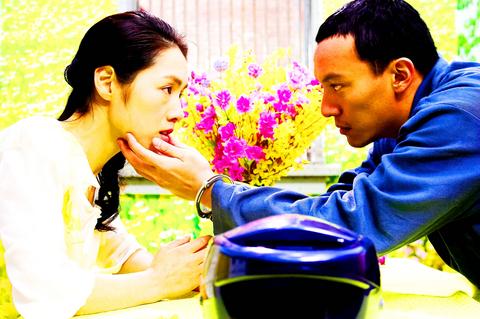Once notorious for dealing with extremity and violence in films such as Bad Guy, South Korean auteur Kim Ki-duk goes for something less disturbing with his latest and 14th feature Breath. This movie, tinted with a quiet and bewildering tone, tells the story of an eccentric romance between a housewife and a condemned criminal.
The film begins with a splash of blood when death row prisoner Jang Jin (Chang Chen, 張震) attempts to take his own life by stabbing himself in the throat with a sharpened toothbrush. The news of his suicide attempt captures the attention of disaffected housewife Yeon (Zia), who passes time doing monotonous housework and sculpting in an immaculate, sterile apartment in Seoul.
Trapped in a loveless marriage with an unfaithful husband, played by Ha Jung-woo, Yeon goes to visit the condemned man on an impulse and reveals her own near-death experience when she held her breath underwater as a child.

PHOTO: COURTESY OF JETTONE FILMS LIMITED
It's the first of several visits during which she redirects her creative abilities into wallpapering and decorating the visiting room and entertaining Jang with a song each time she meets him.
Never speaking a word in return, the man watches the woman curiously and is drawn closer to her each time. Meanwhile, the jail's nameless and faceless overseer, played by the director, takes an unusual interest in observing the two through surveillance cameras.
Agitated by the unforeseen turn of events, the husband struggles to restore orderliness inside the house without much success. One of Jang's cellmates, however, resorts to a more radical method to vent out his homoerotic yearnings for the doomed man.
One of Kim's sparsest works, the film has a cold and unemotional feel with an equally cold and wintry palette, occasionally brightened by spatterings of color when Yeon visits the prison. Though straightforward and realistic in execution, the unflattering picture relies on repetition and minimal dialogue to explore the mysteries of the human mind and heart.
Taiwanese actor Chang turns in a competent performance, employing only bodily gestures and facial expressions to depict the mute prisoner that is much akin to his reticent and melancholy onscreen persona in films by Hou Hsiao-hsien (侯孝賢) and Wong Kar-wai (王家衛). With an unconventional face, the South Korean actress, who goes by the single name Zia, adds more intensity to the story with her catatonic performance. One part that fails, however, is the warden, played by the director himself. The omnipresent prison head seems to deliver little significance to the plot and functions as a script device.
Audience members who expect the film to make sense in accordance with the rules of mainstream storytelling, will be bit frustrated as the characters' backgrounds and motivations are never fully explained. The reason behind the woman's connection with the prisoner and her fascination with death are left unexplored. The crime for which Jang is on death row is only revealed near the end and its enormity seems jarring compared to the sympathetic lead.
Such lack of character expositions is typical of Kim's works, which usually follow a curious logic, valid in their own terms. In the case of Breath, the director contemplates the inability to communicate in his attempt to express the inexpressible through a peculiar and obsessive relationship.

The Taipei Times last week reported that the rising share of seniors in the population is reshaping the nation’s housing markets. According to data from the Ministry of the Interior, about 850,000 residences were occupied by elderly people in the first quarter, including 655,000 that housed only one resident. H&B Realty chief researcher Jessica Hsu (徐佳馨), quoted in the article, said that there is rising demand for elderly-friendly housing, including units with elevators, barrier-free layouts and proximity to healthcare services. Hsu and others cited in the article highlighted the changing family residential dynamics, as children no longer live with parents,

It is jarring how differently Taiwan’s politics is portrayed in the international press compared to the local Chinese-language press. Viewed from abroad, Taiwan is seen as a geopolitical hotspot, or “The Most Dangerous Place on Earth,” as the Economist once blazoned across their cover. Meanwhile, tasked with facing down those existential threats, Taiwan’s leaders are dying their hair pink. These include former president Tsai Ing-wen (蔡英文), Vice President Hsiao Bi-khim (蕭美琴) and Kaohsiung Mayor Chen Chi-mai (陳其邁), among others. They are demonstrating what big fans they are of South Korean K-pop sensations Blackpink ahead of their concerts this weekend in Kaohsiung.

Oct 20 to Oct 26 After a day of fighting, the Japanese Army’s Second Division was resting when a curious delegation of two Scotsmen and 19 Taiwanese approached their camp. It was Oct. 20, 1895, and the troops had reached Taiye Village (太爺庄) in today’s Hunei District (湖內), Kaohsiung, just 10km away from their final target of Tainan. Led by Presbyterian missionaries Thomas Barclay and Duncan Ferguson, the group informed the Japanese that resistance leader Liu Yung-fu (劉永福) had fled to China the previous night, leaving his Black Flag Army fighters behind and the city in chaos. On behalf of the

I was 10 when I read an article in the local paper about the Air Guitar World Championships, which take place every year in my home town of Oulu, Finland. My parents had helped out at the very first contest back in 1996 — my mum gave out fliers, my dad sorted the music. Since then, national championships have been held all across the world, with the winners assembling in Oulu every summer. At the time, I asked my parents if I could compete. At first they were hesitant; the event was in a bar, and there would be a lot